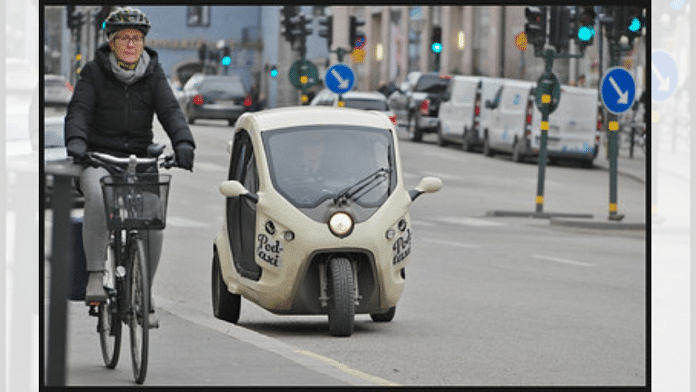Mumbai: To improve connectivity within Mumbai’s plush business district, the Bandra Kurla Complex (BKC), the Mumbai Metropolitan Region Development Authority(MMRDA) is planning to introduce a type of personalised rapid transit system called pod taxis.
The MMRDA, a state government body in charge of BKC, is also looking to link the area with the city’s suburban railway system using these vehicles.
The MMRDA approved the plan in a meeting chaired by Maharashtra Chief Minister Eknath Shinde Tuesday.
Pod taxis are a type of personalised rapid transit system and run on electricity, typically on an elevated track so that traffic on the roads is not disturbed.
A statement from the MMRDA said that Shinde had given the nod to run these pod taxis — “an automatic, high-speed public transit system in BKC on a public-private partnership model”.
According to the MMRDA’s estimates, more than four lakh commuters travel through BKC each day. The complex is located between the Bandra and Kurla suburban railway stations, which are the major hubs for interchanges. The pod taxis are expected to improve connectivity between Bandra station and BKC.
Over the years, BKC has evolved into Mumbai’s prime business hub and boasts of a number of five-star hotels, the National Stock Exchange (NSE), a diamond bourse, upscale malls, an art and performance centre, multiple schools and a large convention centre. The MMRDA has been the special planning authority for BKC since 1977.
The authority has been constantly planning projects to decongest the complex. It has built multiple flyovers and is constructing two metro lines that will pass through BKC-DN Nagar-Mandale and Colaba-Bandra-SEEPZ.
The Metro lines are likely to ease travel to and from BKC, but the only modes of transport that provide micro connectivity within the BKC are private cars, shared auto rickshaws and taxis, and public transport buses.
Also read: SC dismisses 2018 money laundering case against Karnataka Deputy CM DK Shivakumar
Pod taxis to have 38 stations
As decided in the MMRDA meeting Tuesday, the pod taxi network within BKC will be 8.8 kilometres long and will have 38 stations.
Every pod taxi will have a capacity to carry up to six passengers. The pod taxis will ferry passengers at a speed of 40 kilometres per hour.
Pod taxis have been planned and considered multiple times across the country, but these projects have so far failed to materialise.
In Mumbai too, the Maharashtra State Road Development Corporation (MSRDC), another government agency set up primarily for road transport projects, had toyed with the idea of building a pod car network in 2012 to improve connectivity to Mumbai airport.
Since then, pod taxis have been considered in Gurugram in the National Capital Region and in Thane, a satellite town of Mumbai.
Last year, the Uttar Pradesh government approved a pod taxi network between the Noida International Airport and major commercial and entertainment centres.
(Edited by Tikli Basu)



